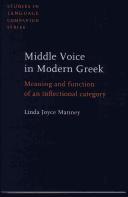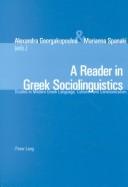| Listing 1 - 10 of 16 | << page >> |
Sort by
|

ISBN: 0198158548 Year: 1987 Publisher: Oxford Oxford University Press
Abstract | Keywords | Export | Availability | Bookmark
 Loading...
Loading...Choose an application
- Reference Manager
- EndNote
- RefWorks (Direct export to RefWorks)

ISBN: 902723051X 1556199341 9786612162978 1282162977 9027298742 9789027298744 9781556199349 9781282162976 Year: 2000 Publisher: Amsterdam : Benjamins,
Abstract | Keywords | Export | Availability | Bookmark
 Loading...
Loading...Choose an application
- Reference Manager
- EndNote
- RefWorks (Direct export to RefWorks)
This book provides an in-depth analysis of the inflectional middle category in Modern Greek. Against the theoretical backdrop of cognitive linguistics, it is argued that a wide range of seemingly disparate middle structures in Modern Greek comprise a complex semantic network, and that this network is organized around two prototypical middle event types, which are noninitiative emotional response and spontaneous change of state. In those cases where middle structures have active counterparts, middle and active variants of the same verb stem are compared in order to demonstrate more clearly the semantic distinctions and pragmatic functions encoded by inflectional middle voice in Modern Greek. Major semantic groupings of middle structures treated include emotional response in particular and psycho-emotive experience in general, spontaneous change of state and/or the resulting state, agent-induced events in which an agent subject is (emotionally) involved with or affected by some aspect of the designated situation, passive-like events in which a patient subject is affected by a nonfocal agent, implicit or specified, and reflexive-like events in which a patient subject and an unspecified agent may overlap to varying degrees.
Greek language [Modern ] --- Middle voice --- Greek language, Modern - Middle voice. --- Greek language, Modern --- Middle voice.
Book
ISBN: 9027228000 1588116247 9786612156793 1282156799 9027294518 9789027294517 9789027228000 Year: 2005 Volume: 76 Publisher: Amsterdam : Benjamins,
Abstract | Keywords | Export | Availability | Bookmark
 Loading...
Loading...Choose an application
- Reference Manager
- EndNote
- RefWorks (Direct export to RefWorks)
This collection of original research focuses on various lesser studied aspects of Greek syntax. The articles combine a sound empirical coverage within current developments of generative theory and cover a wide spectrum of areas. The syntax of sentential structure is dealt with by two articles, one is an extensive analysis of the distribution of goal and beneficiary dative DPs in Greek (and cross-linguistically) and the other addresses the relation agree in small clauses (and between adjectives and nouns). Two articles study the acquisition of the left periphery and of eventivity and one focuses on the historical evolution of participles in Greek, out of which gerunds emerged. The syntax and semantics of wh-clauses in DP positions and of the non-volitional verb θelo are the focus of two articles situated in the syntax-semantics interface. The DP domain is approached by two theoretical articles, one on a Greek possessive adjective and another on determiner heads. The final contribution studies the acquisition of the Greek definite article.
Greek language, Modern --- Romaic language --- Syntax. --- Grammar, Generative. --- Greek language [Modern ] --- Syntax --- Generative grammar --- Grammar, Generative

ISBN: 3906764893 9783906764894 0820446459 9780820446455 Year: 2001
Abstract | Keywords | Export | Availability | Bookmark
 Loading...
Loading...Choose an application
- Reference Manager
- EndNote
- RefWorks (Direct export to RefWorks)
Greek language [Modern ] --- Social aspects --- Greek language, Modern --- Nieuwgrieks. --- Sociolinguïstiek. --- Social aspects.
Multi
ISBN: 3484302569 1306293529 3111635236 Year: 1991 Publisher: Tübingen Max Niemeyer Verlag
Abstract | Keywords | Export | Availability | Bookmark
 Loading...
Loading...Choose an application
- Reference Manager
- EndNote
- RefWorks (Direct export to RefWorks)
German language --- Clitics --- Greek language [Modern ] --- Langues --- Clitiques
Periodical
ISSN: 11053399 Year: 1984 Publisher: 2014-: Athēna: Athēna: Kentrōn Erevnēs tou Mesaiōnikou kai Neou Hellēnismou tēs Akadēmias Athēnōn, Typographeio Agēsil. Zoumadakē,
Abstract | Keywords | Export | Availability | Bookmark
 Loading...
Loading...Choose an application
- Reference Manager
- EndNote
- RefWorks (Direct export to RefWorks)
Book
ISBN: 9607256859 9789607256850 Year: 2002
Abstract | Keywords | Export | Availability | Bookmark
 Loading...
Loading...Choose an application
- Reference Manager
- EndNote
- RefWorks (Direct export to RefWorks)
French language --- Modern Greek language --- Greek language, Modern --- Grec moderne (Langue) --- Dictionaries --- French --- Dictionnaires français --- Dictionnaires français --- Greek language [Modern ]
Book
ISBN: 9051660596 9789051660593 Year: 1989 Publisher: Delft Eburon
Abstract | Keywords | Export | Availability | Bookmark
 Loading...
Loading...Choose an application
- Reference Manager
- EndNote
- RefWorks (Direct export to RefWorks)
Dutch language --- Modern Greek language --- Nieuwgrieks. --- Nederlands. --- Greek language [Modern ] --- Dictionaries --- Dutch

ISBN: 2911053907 9782911053900 Year: 2003 Volume: *1 Publisher: Paris Langues & Mondes - l'Asiathèque
Abstract | Keywords | Export | Availability | Bookmark
 Loading...
Loading...Choose an application
- Reference Manager
- EndNote
- RefWorks (Direct export to RefWorks)
Historical linguistics --- Modern Greek language --- Greek language, Modern --- Grec moderne (Langue) --- History --- Histoire --- -Romaic language --- -History

ISBN: 0007196369 0007687982 9780007196364 9780007224272 0007224273 Year: 2005
Abstract | Keywords | Export | Availability | Bookmark
 Loading...
Loading...Choose an application
- Reference Manager
- EndNote
- RefWorks (Direct export to RefWorks)
-489.3321 --- Greek, Modern --- English language --- Modern Greek language --- Greek language [Modern ] --- Dictionaries --- English
| Listing 1 - 10 of 16 | << page >> |
Sort by
|

 Search
Search Feedback
Feedback About UniCat
About UniCat  Help
Help News
News